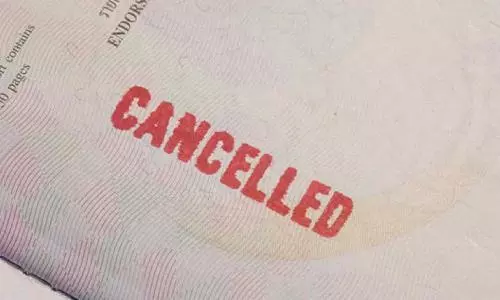
Preserve the equilibrium of Judiciary and Federalism
text_fieldsThere has been much hue and cry over our Judiciary being on the brink of decline since decades.
Amidst the criticisms that those concerned fail to display the required determination to initiate appropriate measures for resolving the issues, more disputes surfacing makes the matter more complicated. Not filling in the vacancies of judges ranging from lower courts to the Supreme Court will not only add to the workload of the judges but the shocking reality of crores of cases lying pending in different courts makes the struggle of the citizens for justice, futile. About 3.5 crore cases supposedly lies pending in several courts. Although the judiciary often confesses that justice delayed was akin to justice denied, the courts including the Supreme Court have failed in making them function in a righteous manner.
The differences between the government and the judiciary in the matters regarding the appointment of judges, their promotions and selections to the apex court, haven’t so far been resolved. Severe opposition was voiced during the discussions related to the creation of an All India Judicial Service for appointments to the subordinate judiciary. While nine High Courts opposed the idea of Judicial Service, eight High Courts including Kerala demanded changes in the proposal. The High Courts claim that the authority over the lower courts would be lost with the formation of a centralized mechanism like All India Judicial Service for judicial appointments and that it would pave way for anarchy in the field of judiciary. Also, many point towards the possible risk of slipping towards a trend that’s likely to undermine the federal system envisaged by the Constitution.
According to the reports, there are 4, 800 vacant posts of judges in the lower courts. The reason for delayed appointments was apparently the dearth of qualified judges with administrative skills. The Law Commission had in 1969 itself recommended certain criteria and systematic practices at the national level for judicial appointments. However, when the Centre and the apex court couldn’t reach a consensus even in matters like the appointment of Supreme Court judges, the issue of appointments to the lower judiciary remained in cold storage. With Narendra Modi storming to power in 2014, the subject became live again when a public interests litigation (PIL) filed by senior advocate Arvind Datar, changed into a letter for the High Courts.
Datar was appointed as the amicus Curiae. He had submitted a Concept Note in the Supreme Court elucidating that the District Judges Recruitment Examination (DJURE) and the All India Judicial Service were not the same. It emphasized that finding eligible and meritorious candidates through a single common examination conducted at the national level was better than the Centre appointing the judges in lower courts across the country. The states could also appoint judges based on their eligibility criteria. The demand for the need of a five-member Central Selection Committee appointed by the Supreme Court Chief Justice for supervising such an exam was also put forth.
That the Judiciary essentially needs a change according to the changes in the society is widely agreed upon. At the same time, the apprehensions whether any of the change would eventually pave way for the power to be centered on the Supreme Court or the Central government, still remains. It’s the recommendations put forth by the Union law Ministry in matters regarding the age limit for the appointments, educational qualification and training towards which states including Kerala has objections. The dispute could be resolved through more discourses. The complete authority for the judicial appointments shouldn’t lie with the Centre. Fears arise whether the Modi government that conquered the tax sector through the GST, would adopt a shortcut path to seize the judiciary as well. Therefore the states should contemplate about an appointment criteria that ensures transparency as well as the federal structure. It doesn’t mean that there isn’t any need of a timely change. Discourses carried out in this regard should emphasize on the effective ways to attract meritorious and capable individuals, with administrative expertise who believe in Constitutional values, towards the judiciary.























